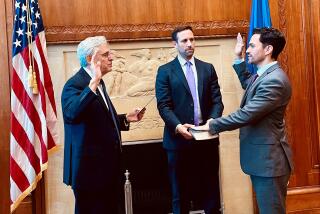Ombudsmen a New Wrinkle in Probe of Army Contractors
- Share via
SAN DIEGO — Veteran San Diego attorney John Einhorn has accepted marching orders from the U.S. Army and is awaiting his first call on a special telephone line that connects his office with the headquarters of a defense contractor here.
Einhorn was recently appointed to serve as Cubic Corp.’s first “independent outside ombudsman,” with special attention to the company’s Defense Systems unit, which makes a variety of equipment for the military. The phone calls he may receive would come from Cubic employees who suspect that the San Diego-based defense contractor might be violating federal procurement laws.
Einhorn’s appointment was the result of a March 25 agreement between Cubic and the Army that followed a settlement ending a civil lawsuit alleging fraud by Cubic in connection with a mine-detector testing and production contract during the early 1980s. The settlement predated the current nationwide investigation into possible defense procurement fraud.
“I would hope that this (appointment) would have far-reaching ramifications,” Einhorn said. “It’s a marvelous idea, and it’s even more important because we’ve just recently been informed about the Pentagon problem and the widespread investigation that’s been going on for the past two years.”
‘Light of Day’
Einhorn has joined a growing number of outside ombudsmen that are being appointed by private companies as part of court and administrative agreements that settle fraud proceedings brought by the Army.
One corporate ethics expert called the outside ombudsman a “new wrinkle” in the Pentagon’s battle to control defense procurement fraud. Army officials, who view the outside ombudsman as “one more way to bring things to the light of day,” have mandated the designation of external ombudsmen in a number of recent administrative settlements that have been negotiated with defense contractors.
Internal corporate ombudsmen and ethics officers are commonplace among the 46 large defense contractors that have voluntarily signed the Defense Industry Initiative on Business Ethics and Conduct, according to project coordinator Alan Yuspeh. The 34 companies that participated in that 1986 voluntary ethics program--prompted by a recommendation from the 1986 Packard Commission, which reported to the President on ways that the government could improve its weapons acquisition methods--received about half of the Department of Defense’s contracts, Yuspeh said.
However, outside ombudsmen have been mandated only in cases where the Army believes that an independent ombudsman will help to restore the integrity of a corporate ethics program, the Army spokesman said.
External ombudsman are being required when “the severity of the problem we’re dealing with demands it,” the spokesman said, adding that external ombudsmen have been required in many of the 31 administrative settlements that have been negotiated this year.
“We think they do work, and as we negotiate more agreements we’ll be looking for more ways to make them effective,” the spokesman said.
By all accounts, however, this trend has not spread to the other services. The Air Force generally has not required outside ombudsmen in its 10 most recent administrative settlements, a spokesman said. A Navy spokesman was unable to say if that service is including outside ombudsmen in recent settlements.
Dozens of companies, including General Electric and Lockheed, have voluntarily hired full-time ethics ombudsmen. Einhorn, the San Diego attorney retained by Cubic, replaced a Cubic executive who previously operated a voluntary internal ombudsman program.
Different Titles
Corporate ethics programs and ombudsmen appeared as a result of “the era of the $700 hammer,” said Gary Edwards, executive director of the Ethics Resource Center, a nonprofit organization in Washington that was formed 10 years ago to strengthen ethical practices in American business. The presence of officials like ombudsmen allows “employees to go around their immediate supervisors with the bad news,” Edwards said.
Although companies use different titles--ethics officer, ethics director and conduct officer--”ombudsman is the best generic term to describe what these people do,” he added.
Winant Sidle, director of ethics for Martin Marietta, a defense contracting firm based in Bethesda, Md., said, “My job is to make sure things get investigated, to find out what the facts are and to make sure it gets properly reported” to an outside organization.
Under its settlement, Cubic paid the Army $7.25 million and dropped a related $3.6 million claim against the service. Cubic also agreed to “continue, and where appropriate, to expand its ethical training and government contract compliance programs,” according to Cubic Chairman and Chief Executive Walter J. Zable.
Cubic contracted with Einhorn, an attorney in San Diego for 19 years, to serve as its part-time, independent ombudsman. He is uncertain how much time he will end up devoting to the job.
Einhorn, who has never represented Cubic in legal matters, told Army investigators that his family has known Zable, Cubic’s founder, for many years. He also told the Army that 20 years ago he spent several months as a law clerk in Cubic’s legal department.
Anonymity to Be Granted
The Army determined that Einhorn’s impartiality would not be sullied by those links to Zable and Cubic.
Last week, Cubic installed the direct telephone line to connect its Defense Systems subsidiary with Einhorn’s office, and the company’s employees have been directed to report suspected legal or ethical violations to him.
The Army said Einhorn is been given the power to grant anonymity to employees who demand it. He will track Cubic’s response to suspected legal and ethical violations and report his findings to the Army’s judge advocate general.
Experts are divided on whether outside ombudsmen will be more effective than their internal counterparts.
Martin Marietta’s Sidle believes that internal ombudsman typically will understand the military’s complex procurement process and have better access to executives who have the corporate power to uncover and curb abuses.
However, an external ombudsman will be better received “if the employees or the (contracting agency) don’t have confidence in top management,” Edwards said.
Einhorn is optimistic that his new role will help install confidence in Cubic’s existing ethics programs.
“I didn’t know that there was such an animal, and I don’t know that there’s a book you can (read) to find out who has successfully had such a practice of being an ombudsman,” Einhorn said. “This kind of thing has got a future. It may be lot larger than anybody ever anticipated.”
More to Read
Inside the business of entertainment
The Wide Shot brings you news, analysis and insights on everything from streaming wars to production — and what it all means for the future.
You may occasionally receive promotional content from the Los Angeles Times.










